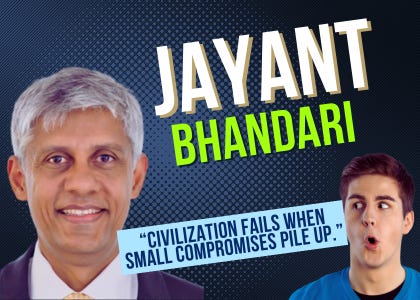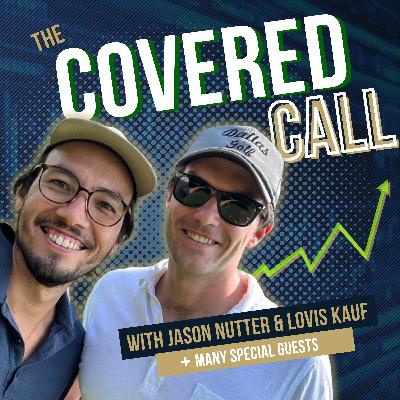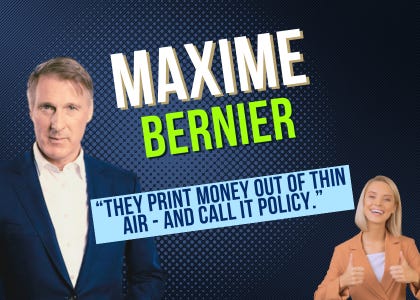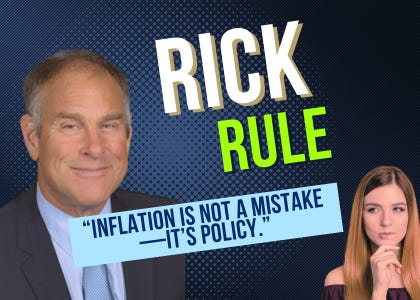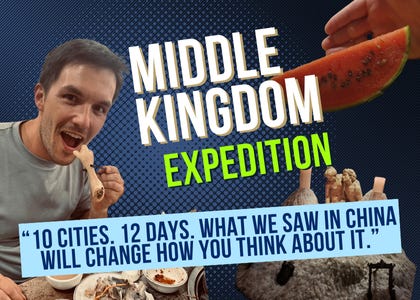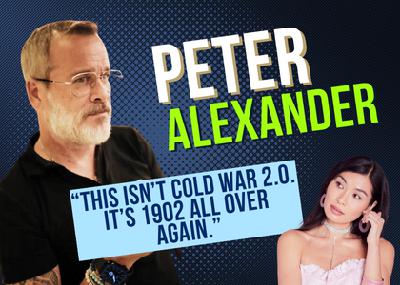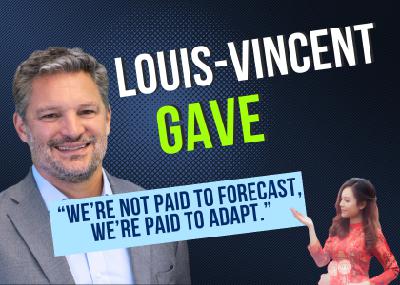Discover The Covered Call Podcast Podcast
The Covered Call Podcast Podcast

The Covered Call Podcast Podcast
Author: Lovis & Jason
Subscribed: 8Played: 67Subscribe
Share
© Lovis Kauf
Description
Attention Freedom Seekers: We are freedom researchers discovering how to be free in an increasingly unfree world. We share stories of entrepreneurs and investors who embrace volatility to increase their independence, hone in on opportunities, and inspire a shared vision that anything is possible.
podcast.thecoveredcallpod.com
podcast.thecoveredcallpod.com
31 Episodes
Reverse
In this episode of The Covered Call, we sit down again with Jayant Bhandari — one of the most provocative and intellectually fearless thinkers we’ve had on the show.In our first conversation, Jayant challenged us to rethink freedom, truth, and the cultural foundations of civilization. Since then, we’ve joined him in Vancouver at his Capitalism & Morality conference — where voices like Rick Rule, Maxime Bernier, Stephan Kinsella, and Amy Wax pushed the boundaries of honest debate.In this new episode, Jayant expands on those ideas — warning that the West is moving toward instability and civil conflict, not because of external enemies, but because of a thousand small compromises eroding trust, discipline, and cultural coherence.We discuss:* Why homogeneity — not diversity — underpins stable, high-trust societies.* How political correctness turned schools into propaganda machines.* Why China’s rise is cultural as much as economic.* What India’s decline reveals about leadership and social philosophy.* And why truth-seeking demands both financial freedom and moral courage.Jayant’s insights are controversial, sharp, and difficult to ignore. Whether you agree or not, this conversation forces you to confront uncomfortable realities about the world we’re living in — and the civilizations we may yet lose.Watch or listen now wherever you get your podcasts.Best,Lovis & JasonPS.: This episode was released with about 2 months of time delay. Since a certain important character is mentioned several times, we thought it prudent to let the heat of the discussion die down. This is self-censorship, make no mistake about it - and we are not proud to do it! But rather than editing it out, we thought this was a way to have our cake and eat it too. This is a public episode. If you would like to discuss this with other subscribers or get access to bonus episodes, visit podcast.thecoveredcallpod.com
In this conversation, Doomburg discusses the current geopolitical landscape, focusing on the war in Ukraine, the economic implications of sanctions, and China's strategic maneuvers in the global arena. The dialogue explores the potential collapse of the European Union, the role of energy in shaping international relations, and the cultural narratives that influence public perception. Doomburg emphasizes the importance of resilience and adaptation in the face of these challenges, while also introducing a new cultural initiative aimed at reinvigorating classic literature. This is a public episode. If you would like to discuss this with other subscribers or get access to bonus episodes, visit podcast.thecoveredcallpod.com
In this episode of The Covered Call, we sit down with Maxime Bernier — former Canadian cabinet minister, founder of the People’s Party of Canada, and one of the few politicians who’s actually walked away from power to defend principle.Maxime spent over a decade inside Canada’s political machine before saying enough was enough. In this conversation, he breaks down why the West is in decline — not just economically, but morally and philosophically — and why liberty, not bureaucracy, is the only real cure.We talk about:* The coming monetary reset and why gold will reprice the entire system* How mass welfare and mass immigration are eroding the social fabric* Why comfort is killing our freedom* And what it takes to leave behind a life of political privilege to stand for convictionA note about this episode:This isn’t a policy debate — it’s a look at the deeper civilizational struggle between freedom and control, responsibility and dependency. Maxime is banging the drum for mass deportations pretty hard, and this rhetoric rubs us, as the hosts of the show, a bit wrong. We are both guests in the countries we choose to live in, and believe in small, efficient government and cannot earnestly reconcile that a small government would engage in actions such as mass deportations. In our own opinion, a small government would rather address the underlying incentives to curb and reverse the kind of immigration that would bring a society over its “carrying capacity”. Please listen to the end, where Jason and Lovis recap and share more of our personal view on the subject.Stay free,Lovis & Jason This is a public episode. If you would like to discuss this with other subscribers or get access to bonus episodes, visit podcast.thecoveredcallpod.com
We’re back with one of our favorite guests — Rick Rule — just as gold crosses $4,000 an ounce.Last time Rick joined The Covered Call, Bitcoin had hit $100,000. This time, he’s back to explain why the arithmetic of America no longer adds up - and why that’s great news for people with real skills.Rick argues that what’s coming isn’t an honest default, but a dishonest one - a slow erosion of purchasing power disguised as stability.But instead of despair, he offers a blueprint for thriving in chaos:“People who deliver real utility in a free market will do extraordinarily well.”In this conversation, we cover:* Why inflation isn’t an accident, it’s policy.* How to use volatility and liquidity to your advantage.* Why the next decade will punish the entitled and reward the capable.* Why Rick is “celebrating retirement by starting a bank.”* What true freedom means in an age of dishonest money.Rick’s message is timeless - and timely: crisis is the sorting mechanism that separates the useful from the dependent.If you enjoy it, share it with someone who’s preparing for the next decade rather than hiding from it.See you inside,Jason & Lovis This is a public episode. If you would like to discuss this with other subscribers or get access to bonus episodes, visit podcast.thecoveredcallpod.com
What does energy have to do with freedom? More than you might think.We sat down with David Fishman, an American who is a longtime China resident, energy consultant, and writer of Crossing the River by Feeling the Stones. David has spent over a decade inside China’s transformation, advising multinationals on nuclear, renewables, and grid economics - while also telling the stories of ordinary people navigating those changes. This is a public episode. If you would like to discuss this with other subscribers or get access to bonus episodes, visit podcast.thecoveredcallpod.com
In this conversation, Lovis and Jason engage with Rahim Taghizadegan, a true Austrian economist, to explore the concept of praxeology, the complexity of human action, and the relevance of Austrian economics in today's society. They discuss the importance of realism in economics, the role of community in learning, and the challenges posed by uncertainty in economic systems. The conversation also touches on the decline of trust in institutions, cultural perspectives on freedom, and the impact of technology on economic change. Throughout, they emphasize the need for resilience, critical thinking, and adaptability in navigating the future of economic systems. In this conversation, the speakers explore the drivers of change in Europe, the complexities of democracy, and the emerging role of Bitcoin as a wealth asset. They discuss the limitations of gold compared to Bitcoin, the future of Bitcoin adoption, and the implications of state involvement in wealth redistribution. The conversation highlights the dynamic nature of political and economic systems, emphasizing the need for adaptability and critical thinking in understanding these changes. This is a public episode. If you would like to discuss this with other subscribers or get access to bonus episodes, visit podcast.thecoveredcallpod.com
We just got back from 12 days on the ground in China—what we’re calling the Middle Kingdom Expedition—and sat down while the jet lag was still fresh to capture our impressions.This wasn’t a sightseeing tour. It was a boots-on-the-ground, trains-and-taxis, cigars-and-coffee kind of trip—ten cities in twelve days—meeting people, building connections, and getting a firsthand feel for life and business in modern China.We went in with plenty of questions and a few preconceived notions. Some were confirmed, many were flipped upside down.From Shenzhen’s whisper-quiet electric streets to unexpected home-cooked dinners with near-strangers, the warmth and openness we encountered caught us off guard—in the best possible way.In this episode, we talk about:* The surprising beauty and style of Chinese cities* Cultural nuances that unlock deeper connections* Why politics rarely came up (and why that matters)* The vanishing expat scene—and the opportunities that might create* Our biggest takeaways for anyone curious about working with China todayWhether you’re China-curious, a fellow freedom seeker, or just here for the travel stories, this one’s packed with moments that made us stop and say, “Wait, this isn’t what I expected.”See you inside,Lovis & Jason This is a public episode. If you would like to discuss this with other subscribers or get access to bonus episodes, visit podcast.thecoveredcallpod.com
In this conversation, Peter Alexander shares his extensive experience and insights on the complex relationship between the United States and China. He discusses the misconceptions surrounding China, the impact of sanctions, and the need for a more nuanced understanding of China's strategic goals. The dialogue emphasizes the importance of cooperation over competition and explores potential paths for a collaborative future between the two powers.Chapters00:00 The China Conversation Nobody Wants to Have06:02 Understanding the Current US-China Relations11:44 China's Strategic Moves in Technology and Trade16:40 The Underestimation of China's Capabilities23:30 China's Global Image and Soft Power25:00 Understanding China's Export Dynamics30:24 The U.S. Response to China's Economic Strategies35:58 China's Manufacturing Efficiency and Quality Improvements43:55 The Shift in Global Technology and Innovation49:35 Navigating U.S.-China Relations: Cooperation vs. Competition56:59 The Complementary Nature of US-China Relations01:05:26 Understanding China's Capitalism01:13:35 The Chinese Perspective on Global Events01:18:29 Envisioning a Collaborative Future01:23:29 The Path Forward for US-China Relations01:26:25 Overtime This is a public episode. If you would like to discuss this with other subscribers or get access to bonus episodes, visit podcast.thecoveredcallpod.com
Willem Middelkoop shares his extensive career journey, emphasizing the importance of curiosity, independence, and understanding financial systems. He discusses his various roles, from photojournalism to fund management, and highlights the significance of being adaptable and open to new opportunities. Willem delves into the complexities of the financial system, the current geopolitical landscape, and the future of investments, advocating for a proactive approach to wealth management. He defines freedom not just in financial terms but as a state of being that allows for personal exploration and fulfillment.TakeawaysWillem emphasizes the importance of freedom and independence in his life.Curiosity drives Willem's career choices and investments.He believes in opening multiple doors to opportunities.Understanding money is crucial, as many take it for granted.Willem's journey reflects a balance between risk and reward.He advocates for a proactive approach to investing.The current geopolitical landscape presents both risks and opportunities.Willem defines happiness as a consistent state of being, not just peak moments.He believes the journey of investing is more fulfilling than the destination.Willem's philosophy encourages following one's inner compass. Chapters00:00 Introduction to Willem Middelkoop04:41 Willem's Career Journey and Philosophy12:33 The Importance of Curiosity and Flexibility21:25 Understanding Money and Financial Independence29:14 The Complexity of the Financial System36:39 Traveling and Observing Economic Disparities48:37 Defining Freedom and Independence49:04 Finding Happiness in Simplicity51:01 The Journey vs. The Destination52:14 Understanding Wealth and Financial Freedom54:56 Navigating Global Financial Shifts58:45 Investment Strategies for the Future01:01:19 The Joy of Daily Routines01:05:06 Reflections on Career Choices01:08:17 The Future of Investing and Personal GrowthLinks:Commodity Discovery Fund: https://en.cdfund.com/The Big Reset Book: https://a.co/d/iNEVL3G This is a public episode. If you would like to discuss this with other subscribers or get access to bonus episodes, visit podcast.thecoveredcallpod.com
What if the biggest problems we face - climate change, AI, even war - have no nationality?We sat down with Jen Zhu Scott: investor, entrepreneur, mom, and the visionary behind PowerDynamics.ai.Named one of Forbes’ Top Women in Tech, Jen has advised HBO’s Silicon Valley, spoken on the TED stage, and now she’s building containerized compute and energy infrastructure to decentralize power—both literally and figuratively.But this episode goes much deeper than tech.We talk about:* Growing up in West China and catching a “lucky break” in Shenzhen* Why younger generations “lying flat” may be more evolved than we think* What it means to raise grounded kids in an AI-driven world* How Taoism helps her navigate leadership, parenting, and uncertainty* Why the West keeps getting surprised by China—and what that revealsAnd she drops one line we’ll never forget:“The biggest problems in the world aren’t American, Chinese, or German. They’re human.”If you care about the future - yours, your kids’, or the planet’s - this one’s worth your time.As always, thank you for being part of this curious and freedom-seeking tribe.Lovis & Jason This is a public episode. If you would like to discuss this with other subscribers or get access to bonus episodes, visit podcast.thecoveredcallpod.com
In this episode, Jason and Lovis engage with Alex Ostergaard, exploring his unique background, influences, and insights into personal development and investment strategies. Alex shares his journey from a non-traditional education path to becoming a successful real estate investor in Switzerland, emphasizing the importance of applying theories in real life. The conversation delves into the significance of self-image, resilience, and the impact of Austrian economics on decision-making and investment strategies. In this conversation, Alex shares insights into his family's real estate business, emphasizing the importance of having a personal stake in investments. He discusses the advantages of investing in Swiss real estate compared to other markets, highlighting the stability and potential returns. The conversation also touches on the significance of due diligence, the impact of currency strength on investment returns, and the future goals of the business. This is a public episode. If you would like to discuss this with other subscribers or get access to bonus episodes, visit podcast.thecoveredcallpod.com
In this engaging conversation, CJ Gustafson shares his unique approach to business and writing, emphasizing the importance of being approachable and authentic. He discusses his journey of discovering product-audience fit, the balance between cash and equity businesses, and the significance of building relationships within the community. The discussion also touches on the impact of AI on business efficiency, the challenges of buying existing businesses, and the importance of obsession in entrepreneurship. Ultimately, CJ highlights the need for work-life integration and the joy of pursuing one's passions while creating value for others. This is a public episode. If you would like to discuss this with other subscribers or get access to bonus episodes, visit podcast.thecoveredcallpod.com
Join us as we sit down with Louis Vincent Gave, CEO of Gavekal, a leading financial research and fund management firm known for its East-West perspective. In this episode, recorded just weeks after Trump’s inauguration, Louis dives into the shifting global landscape - from a multipolar world and U.S. dominance to China’s industrial leapfrog over the West. With his unique vantage point from Hong Kong, Beijing, and beyond, Louis shares insights on macro investing, raising resilient kids in an AI-driven future, and why he bets on the renminbi and Brazilian markets. Plus, hear his take on must-read books like Parkinson’s Law and The General Theory of Portfolio Construction from his father’s work. Whether you’re an investor, parent, or global thinker, this conversation is packed with wisdom and wit!PS.: Only after the recording did we realize that the audio quality of Louis's track was poor. We used AI to enhance it - this made the audio useable but some distortions are noticeable. We kindly ask you to excuse us. This is a public episode. If you would like to discuss this with other subscribers or get access to bonus episodes, visit podcast.thecoveredcallpod.com
Swen Lorenz shares his unique journey as an investor, entrepreneur, and writer, emphasizing the importance of contrarian thinking, networking, and pursuing freedom. He discusses his early interest in investing, the value of non-traditional education, and the lessons learned from both successes and failures in his career. Swen also highlights the significance of building relationships and the opportunities available in cities like London, as well as his experiences living on the island of Sark. The discussion culminates in insights about the current investment landscape and the upcoming Weird S**t Investing Conference.Chapters00:00 Introduction to Swen Lorenz and His Journey03:51 The Importance of Taking Risks and Networking06:29 Education vs. Real-World Experience09:40 The Role of Freedom and Independence in Career Choices12:37 Establishing a Productive Routine15:25 The Impact of Location on Opportunities18:45 Building a Community and Networking Effectively21:21 Entrepreneurship: The Reality Behind the Glamour24:27 The Value of Consistency in Content Creation27:33 Weird S**t Investing: A Unique Investment Conference30:48 The Power of Contrarian Thinking in Investing46:23 Event Exclusivity and Vetting Process47:25 Investment Beliefs and Market Overvaluation50:17 The Value of Risk and Entrepreneurship53:19 AI and Originality in Investment Ideas55:17 Lessons from a $7 Million Failure57:53 Building a Network and Online Presence59:17 Reflections on the Conversation This is a public episode. If you would like to discuss this with other subscribers or get access to bonus episodes, visit podcast.thecoveredcallpod.com
In this episode, Lovis and Jason sit down with Luke Gromen to explore the intersection of family, freedom, and finance, drawing on Luke's transformative journey from his formative Boy Scout experiences to his rise as a leading macroeconomic thinker and founder of FFTT, LLC. The conversation delves into the lessons Luke learned navigating the 2008 financial crisis, the pivotal decision to embrace creative control in his career, and the profound influence of mentorship and family on his personal and professional success. With reflections on resilience, the evolving global economy, and the balance between independence and responsibility, this episode offers a deeply personal and thought-provoking look at what it means to live life on your own terms.TakeawaysThe balance between risk-taking and safety is crucial.Experiences in the Boy Scouts taught resilience and survival skills.Creative control in business allows for authentic expression.The 2008 financial crisis reshaped economic understanding.COVID-19 accelerated changes in economic dynamics.Maintaining freedom requires a balance between systems.Mentorship plays a vital role in personal development.Choosing the right partner is essential for success.Family and relationships provide the richest experiences in life. Flexibility in thinking is key to navigating challenges.Chapters00:00 Introduction and Background02:25 Formative Experiences and Lessons from Boy Scouts05:18 Parental Influence and Risk Management07:56 Transitioning to Professional Life11:00 The Impact of 2008 Financial Crisis13:44 Starting FFTT and Creative Control16:35 Navigating Macro Trends and Market Changes19:39 The Evolution of Economic Dynamics Post-COVID22:13 Personal Reflections on Freedom and Technology25:15 Advice for Freedom-Minded Individuals28:04 The Future of Economic Systems and Global Relations48:27 The Impact of Technology on Financial Freedom51:06 Mentorship and Personal Growth53:40 Investments Beyond Career: Family and Fitness56:31 The Importance of Choosing the Right Partner59:40 Family as an Asset01:01:15 Navigating Life's Choices and Luck01:02:12 Closing Thoughts and Future Aspirations This is a public episode. If you would like to discuss this with other subscribers or get access to bonus episodes, visit podcast.thecoveredcallpod.com
In this engaging conversation, Ferg shares his unconventional journey from a sheep and beef farm in New Zealand to living a fulfilling life in Bali as a contrarian investor. He discusses his transition from traditional asset management to trading, the importance of finding value in hated sectors, and his insights on the current market landscape. Ferg emphasizes the significance of family, freedom, and community, while also addressing the realities of renewable energy and the investment opportunities in China. His passion for Brazilian Jiu-Jitsu (BJJ) serves as a metaphor for his approach to life and investing, highlighting the balance between physical and mental challenges.Check out Ferg's Substack at: traderferg.substack.comTakeawaysFerg transitioned from farming to finance after realizing the unpredictability of agriculture.He found inspiration in a mentor who taught him about investing in hated sectors.Living in Bali allowed Ferg to manage his own investments and enjoy a lower cost of living.Ferg emphasizes the importance of family and spending quality time with loved ones.He believes in the value of transparency and sharing mistakes in the investment community.Ferg's investment strategy focuses on finding value in unloved sectors and contrarian opportunities.He discusses the challenges of relying solely on renewable energy sources.Ferg sees potential in the Chinese market despite negative sentiment.His approach to investing is influenced by his experiences in Brazilian Jiu-Jitsu.Ferg believes that personal development and physical fitness are crucial for mental clarity.Chapters00:00 Ferg's Journey: From New Zealand to Bali 11:05 Investing Philosophy: Contrarian Insights and Market Strategies 20:32 The Coal Debate: Economic Realities vs. Environmental Concerns 21:32 The Energy Crisis in Germany 26:56 The Challenges of Renewable Energy 32:17 The Illusion of Energy Transition 36:04 Finding Freedom in Lifestyle Choices 40:49 Building a Community Through Authenticity 49:11 Investment Strategies and Market Insights 01:00:06 China's Rise and Global Manufacturing Dynamics 01:02:13 The Complexity of US-China Relations 01:04:00 Investment Perspectives on Chinese Stocks 01:06:24 The Impact of Passive Investing on Market Dynamics 01:08:15 The Role of BJJ in Personal and Professional Life 01:12:13 Navigating Market Volatility and Personal Well-being 01:14:29 Introduction to Ferg's Substack This is a public episode. If you would like to discuss this with other subscribers or get access to bonus episodes, visit podcast.thecoveredcallpod.com
Rick Rule on Entrepreneurship: Deliver Value and ThriveIn this episode of the Covered Call Podcast, we engage with legendary contrarian investor Rick Rule, exploring his insights on Bitcoin, natural resources, and the principles of capitalism. Rick shares his journey into the world of gold and investments, emphasizing the importance of understanding market dynamics and the risks associated with speculation. The conversation delves into cultural perspectives on capitalism, the significance of building a personal brand, and the launch of Rick's new venture, Battle Bank, which aims to serve aspiring individuals seeking financial independence. Takeaways:- Rick Rule emphasizes the importance of understanding market forces before investing. - He believes Bitcoin and cryptocurrencies are outside his competitive advantage. - Gold has the potential to regain its role as a medium of exchange. - Rick's journey into natural resources was driven by a combination of personal interests and market opportunities. - He defines capitalism as solving societal problems for profit. - Cultural perspectives on capitalism vary significantly across countries. - Rick highlights the risks associated with state intervention in markets. - He advocates for a service mindset in business to build lasting relationships. - Education and value delivery are key to building a personal brand. - Rick's new venture, Battle Bank, aims to empower individuals with financial independence. Chapters:00:00 - Introduction and Context Setting 01:46 - Bitcoin and Cryptocurrency Perspectives 05:00 - The Future of Gold and Blockchain Technology 07:49 - Rick Rule's Journey into Natural Resources 10:42 - Capitalism and Libertarianism Explained 16:50 - Cultural Perspectives on Capitalism 20:45 - Risk, Speculation, and Philanthropy 25:45 - Practical Steps for Promoting Capitalism and Libertarianism28:39 - Building a Personal Brand in the Digital Age 32:06 - The Power of Education and Value in Marketing 35:29 - The Shift from Sales to Service Mindset 38:19 - Finding Freedom and Purpose in Work 41:53 - Lessons Learned from Market Experiences 45:32 - The Importance of Asking for Help 48:12 - Physical Fitness and Its Role in Life 50:28 - Reflections on Wealth and Market Understanding 52:36 - Introducing Battle Bank: A New Banking Concept Rick's projects: https://battlebank.com/ https://www.ruleinvestmentmedia.com/ https://ruleclassroom.com/ This is a public episode. If you would like to discuss this with other subscribers or get access to bonus episodes, visit podcast.thecoveredcallpod.com
Thrive Despite Chaos: Doug Casey’s AnCap Blueprint for a Life of FreedomIn this engaging conversation, Doug Casey shares his insights on a variety of topics, including his life in Uruguay, the appeal of South America, the importance of travel, and the evolution of his beliefs. He discusses the current state of capitalism, the future of gold and Bitcoin, and the significance of mentorship. Doug also reflects on the decline of education and the value of building genuine friendships, all while emphasizing the importance of being proactive in life and the role of speculation in the financial world. Books by Doug Casey:- Speculator (first novel in his series with co-author John Hunt) - Drug Lord (second novel in the series) - Assassin (third novel in the series) - Upcoming: Terrorist (next installment in the series) - Upcoming: The Preparation Books Doug References:- You Can Profit from the Coming Devaluation by Harry Browne - The Virtue of Selfishness by Ayn Rand - Economics in One Lesson by Henry Hazlitt - The Market for Liberty by Morris and Linda Tannehill - The Conscience of a Conservative by Barry Goldwater - Diamond Age by Neal Stephenson - Thinking the Unthinkable by Herman Kahn - On Thermonuclear War by Herman Kahn Takeaways:- Doug Casey emphasizes the importance of travel for personal growth. - He believes that South America offers unique opportunities for those seeking freedom. - Doug discusses the decline of traditional education and the need for critical thinking. - He advocates for finding mentors to guide personal and professional development. - Doug views Bitcoin as a viable alternative to traditional currencies.- He expresses optimism about the future of Argentina under new leadership. - Doug highlights the difference between speculation and investment. - He believes that genuine friendships are built on shared values and character. - Doug argues that morality can be navigated through rational philosophy rather than religion. - He stresses the importance of being proactive in life to achieve personal goals. Chapters: 00:00 - The Influence of Generations 11:18 - Traveling and Living Abroad 21:07 - The Impact of Social Media on Society 21:19 - The Importance of Source Verification 23:43 - Traveling as a Tool for Perspective 26:13 - Navigating Morality Without Religion 29:18 - Libertarianism and Moral Philosophy 33:23 - The Life of a Speculator 37:33 - Understanding Fascism in Modern Economics 41:35 - The Role of Gold in Investment Strategies 44:17 - The Value of Mentorship 47:40 - Imagining a World Without Nation-States 51:24 - Building Genuine Friendships and Communities 01:07:25 - Reflections on Regrets and Moral Mistakes 01:09:05 - The Evolution of Beliefs: Nature vs. Nurture 01:14:30 - Argentina's Political Landscape and Economic Optimism01:17:51 - Global Threats: Nuclear War and Its Implications 01:29:00 - Speculation in the Digital Age: Bitcoin and Beyond Doug’s Media Outlets and Projects: - International Man Website: internationalman.com - Weekly articles by Doug and other contributors. - Doug Casey’s Take YouTube Channel: @DougCaseysTake Co-hosted with Matt Smith, discussing politics, economics, and speculation. - Doug's Novels Speculator, Drug Lord, Assassin (Available on Amazon). This is a public episode. If you would like to discuss this with other subscribers or get access to bonus episodes, visit podcast.thecoveredcallpod.com
East Meets West: Jason Explores the Cultural Divide on Change and ValuesThis conversation explores the contrasting perspectives between Western and Asian views, particularly focusing on how Westerners perceive China and how Chinese people view themselves. The speaker, Jason, shares insights from his personal experiences and observations, discussing cultural celebrations, foundational texts, and moral philosophies. He emphasizes the importance of understanding these differences to foster better communication and relationships between cultures.Takeaways:- Western views of China often rely on stereotypes and misconceptions.- Cultural celebrations reflect deeper values and beliefs in each society.- The Chinese Lunar New Year symbolizes overcoming challenges rather than celebrating change.- Foundational texts in Chinese culture emphasize inherent goodness, contrasting with Western views of original sin.- The golden rule encourages action in the West, while the silver rule promotes caution in the East.- Understanding cultural differences can improve international relations and business practices.- The Chinese perspective on change is often cautious and pragmatic.- Western ideals often prioritize individualism and action, while Chinese ideals focus on harmony and balance.- China's approach to global influence is more about stability than expansionism.- Future interactions between East and West will require nuanced understanding and respect for differences.Chapters:00:00 - Introduction to Cultural Perspectives03:04 - Western Views on China05:56 - Cultural Context: Celebrations and Traditions11:26 - Foundational Texts: East vs. West17:33 - Moral Frameworks: Golden and Silver Rules20:17 - Practical Applications of Ideals26:07 - Future Implications of Cultural Differences32:41 - China's Global Perspective and Historical Context34:05 - China's Quest for Stability and Strength This is a public episode. If you would like to discuss this with other subscribers or get access to bonus episodes, visit podcast.thecoveredcallpod.com
Freedom Redefined: Peter Alexander and his 30-Year Journey in ChinaIn this episode, Lovis and Jason engage in a deep conversation with Peter Alexander, who shares his unique journey of moving from the U.S. to China and his experiences living there for nearly three decades. The discussion covers various themes, including the dynamics of manufacturing in China, the implications of the TSMC lawsuit, and the contrasting economic systems of China and the West. Peter emphasizes the importance of understanding China's geopolitical advantages and the challenges faced by the U.S. in competing with China's manufacturing prowess. The conversation also touches on cultural insights and the perception of freedom in China, as well as the future of manufacturing and economic resilience in both regions. In this conversation, Peter Alexander discusses the complexities of freedom in China, contrasting it with Western perspectives. He explores the cultural nuances that shape the understanding of freedom among Chinese citizens and highlights the opportunities and challenges present in the current economic landscape. Peter reflects on his personal journey and the evolving nature of entrepreneurship in China, emphasizing the importance of adaptability and understanding local dynamics.- Peter moved to China at 25, driven by a desire for change.Takeaways:- His initial plan was to teach English, but he fell in love with China.- China's manufacturing capabilities are a significant geopolitical advantage.- The U.S. has moved closer to China's centralized system.- Tariffs alone won't solve the manufacturing challenges in the U.S.- Cultural differences impact business practices between the West and China.- China's economic model is shifting towards sustainability and efficiency.- The West is experiencing a sense of demoralization compared to China's growth.- Manufacturing expertise is being lost in the West due to outsourcing.- A grand bargain between the U.S. and China is necessary for future cooperation. Freedom is perceived differently in China compared to the West.- Cultural differences play a significant role in understanding governance.- The Chinese government has a unique way of engaging with its citizens.- There is a gray area in Chinese society that allows for personal agency.- Opportunities in China are still abundant, especially for entrepreneurs.- The perception of freedom can be influenced by societal norms and expectations.- Navigating the business landscape in China requires understanding local rules.- The impact of COVID-19 has shifted societal attitudes towards work.- Personal experiences shape one's view of freedom and opportunity.- The future of entrepreneurship in China is promising despite challenges.Chapters:00:00 - Introduction to Peter Alexander and His Journey to China06:14 - The Unconventional Move: Why Peter Chose China 12:00 - Education and Career Development in Shanghai 18:00 - Manufacturing Dynamics: The China Advantage 23:33 - Cultural Perspectives: East vs. West in Business 29:39 - The Future of Manufacturing: Challenges and Opportunities34:12 - Quality and Efficiency in Manufacturing 38:37 - The Competitive Landscape: China vs. the West 45:35 - Cultural Reflections: Perspectives on Freedom 56:42 - Navigating the Gray Areas of Chinese Society 01:15:54 - Navigating Legal Ambiguities in China 01:17:53 - Defining Freedom and Democracy 01:19:26 - Agency and Individual Responsibility in China 01:24:58 - Opportunities and Challenges in the Chinese Market01:29:19 - Immigration and Work Opportunities in China 01:32:35 - Personal Reflections on Life and Career GoalsKeywords:China, manufacturing, economic systems, TSMC, Peter Alexander, Western culture, globalization, Shanghai, cultural insights, economic resilience, China, freedom, cultural differences, opportunities, personal agency, economic landscape, globalization, entrepreneurship, social media, governanceLinks:z-ben.com - Peter’s advisorypremium.coverd.io - Free Options Trading App This is a public episode. If you would like to discuss this with other subscribers or get access to bonus episodes, visit podcast.thecoveredcallpod.com


